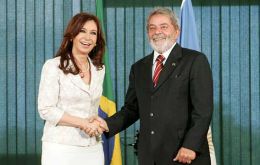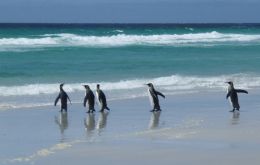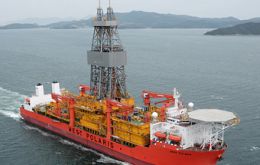MercoPress. South Atlantic News Agency
Stories for 2009
-
Friday, March 6th 2009 - 09:00 UTC
Trichet promises “non standard measures” to prop Euro economy

The European Central Bank (ECB) has cut its key interest rate to 1.5% from 2.0%, the lowest since it started setting euro rates in January 1999. It followed a cut in UK rates by the Bank of England. US and Japanese rates are, in effect, already at zero.
-
Friday, March 6th 2009 - 08:58 UTC
Brazil Argentina trade clash; dispute could reach WTO

Brazil’s Foreign Trade Secretary Welber Barral admitted publicly that Brasilia is considering taking its trade dispute claims with Argentina to the World Trade Organization. Insistent leaks to the press from “reliable sources” anticipated for days the growing trade rift between Mercosur two main partners.
-
Friday, March 6th 2009 - 05:20 UTC
Argentine remains to be buried in Falkland Islands

Full military honours will given to the burial of Argentine remains in the Falklands on Saturday.
-
Thursday, March 5th 2009 - 23:00 UTC
Argentine/Brazil bilateral trade drops 40% in Jan-Feb

Bilateral trade between Argentina and Brazil continued to deteriorate during the first two months of the year, according to official statistics released in Brasilia. Ministry of Development, Industry and Foreign Trade said that exports to Argentina in January-February were down to 1.33 billion US dollars which represents 46.5% less than Jan-Feb. 2008.
-
Thursday, March 5th 2009 - 17:36 UTC
Chavez seizes US food company

Hugo Chavez, the Venezuelan president, has seized one food company and threatened to nationalise another as he demands that the industry produce cheaper rice.
-
Thursday, March 5th 2009 - 17:23 UTC
Falklands’ oil company submits green impact report

As was anticipated Desire Petroleum has submitted an environmental impact assessment (EIA) to the Falkland Islands government it was reported in London.
-
Thursday, March 5th 2009 - 17:22 UTC
Exxon reports oil discovery off the Brazilian coast

United States ExxonMobil has notified Brazilian regulatory agency Agencia Nacional de Petroleo, Gas Natural e Biocombustiveis (ANP) that it has found indications of hydrocarbons in block BM-S-22 off the Brazilian coast. The discovery was made in well 1-ESSO-3SPS.
-
Thursday, March 5th 2009 - 17:19 UTC
Andean tunnel project to physically integrate Mercosur

A Chilean and an Argentine company signed a partnership this week for the construction of a low altitude tunnel crossing the Andes to connect the neighboring countries, the crucial link for a bi-oceanic project dating back to 1994.
-
Thursday, March 5th 2009 - 17:12 UTC
Bad news for Latin America

With Europe and America struggling to address the ongoing global economic crisis, the forces of economic nationalism are on the march. Industry representatives and trade unions are busy lobbying the halls of power in Washington, Brussels, Paris, and London. They are seeking subsidies, tariff protection from foreign competition, restrictions on foreign labor, and even measures that pressure Europeans and Americans into buying domestically-made products.
-
Thursday, March 5th 2009 - 17:09 UTC
Gibraltar & recession: “little Britain in the sun”, or the Rock?

At the Gibraltar border, a steady stream of pedestrians and vehicles enters the territory. It is mid-morning, and the Spanish are coming. Overhead, the Union flag flutters nervously, as it has, in one form or other, since Spain ceded the Rock to the UK in 1713.
